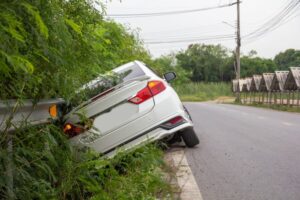Car Driver Fatigue
Driving is an activity that requires a person behind the wheel to maintain physical coordination and sharp alertness at all times. However, as humans, we cannot maintain the necessary level of coordination and alertness when fatigue sets in.
When this happens, many of the driver’s cognitive and physical functions diminish, which prevents them from driving safely and increases the risk of accidents.
Car driver fatigue is dangerous for the fatigued driver himself/herself and all other road users around them. Unfortunately, it is not always obvious that fatigue or drowsiness contributes to a car crash.
In this post, we will discuss the dangers associated with car driver fatigue, the causes of driving in a state of mental and physical exhaustion, and how you can build a legal case against the fatigued driver.
If you suffered injuries, immediately consult a car accident lawyer about your specific options.
Request A Free Consultation Today!
What Is Car Driver Fatigue and How Does It Affect Driving Abilities?
Fatigued driving means operating a motor vehicle in a state of physical or mental exertion, which impairs the person’s ability to drive safely. Statistically, about 100,000 police-reported accidents involve fatigued and drowsy drivers yearly.
When a driver is fatigued, they are likely to:
- React slowly to hazards (or fail to react at all)
- Nod off
- Make poor decisions
- Drift into adjacent lanes
- Misjudge the speed of other vehicles and distances
- Forget the last miles driven
One study compared the effects of being awake for 20 hours with the effects of having a blood alcohol concentration (BAC) of 0.08 percent on driving and found that drowsy drivers experience similar impairments as their drunk counterparts. The problem with car driver fatigue is that, unlike driving under the influence, it is not easily proven.
The Dangers of Driving While Fatigued
Driver fatigue can severely compromise a person’s driving abilities by adversely affecting several critical cognitive and physical functions:
- Slower reaction time to hazards: One of the most prominent risks of driving while fatigued is that the driver cannot respond to sudden changes in road conditions or unexpected events. This delay in reaction time can be the difference between avoiding an accident and being involved in one.
- Impaired decision-making: An exhausted driver may struggle to make sound and timely decisions. Fatigue affects judgment, making assessing situations accurately and choosing the appropriate action more difficult. It can lead to misjudgments in speed, distance, and the ability to navigate safely through traffic.
- Decreased alertness: Fatigue leads to a decrease in overall alertness. Drivers may miss road signs, traffic signals, or changes in traffic patterns. They might also overlook the actions of other road users, which can increase the likelihood of collisions.
- Altered perception: Fatigue can change how a driver perceives risks and distances. Tired drivers may have trouble gauging the speed of other vehicles or misjudge the space needed for maneuvers such as lane changes or turns.
- Potential for microsleep: The most dangerous effect of driver fatigue is the phenomenon known as microsleep. This involuntary response can cause a person to fall asleep for a few seconds without realizing it. During these brief bouts of sleep, the driver is completely disengaged from controlling the vehicle, which can lead to disastrous consequences on the road.
Despite the known dangers associated with fatigued driving, many drivers choose to get behind the wheel or continue driving after fatigue sets in and end up endangering themselves and everyone around them.
Common Causes of Car Driver Fatigue
Many factors influence driver fatigue.
Some of the most common reasons why people get fatigued while driving include:
- Not sleeping enough: Lack of adequate sleep is one of the primary causes of driver fatigue. Most adults need between seven and nine hours of sleep per night, but many do not achieve this due to work demands, social activities, or other factors. Operating a vehicle without enough rest can impair reaction times and decision-making abilities, increasing the risk of accidents.
- Staying awake for too long: When a driver has been awake for an extended period, the body naturally drifts toward a sleep state, leading to fatigue. It is particularly dangerous when driving for long stretches without adequate breaks, as the monotony and the steady hum of the engine can lull a driver into a state of drowsiness.
- Late-night driving: Driving late at night poses additional risks due to the body’s natural circadian rhythm, which makes us feel tired after dark. These hours, typically between midnight and 6 AM, are when the body craves sleep the most, and fighting this natural inclination can lead to inevitable driver fatigue.
- Driving for long hours: Long, continuous periods of driving without taking regular breaks can result in fatigue. Professional drivers or those on long road trips are particularly susceptible. The constant vigilance required to operate a vehicle safely can be mentally draining, leading to drowsiness.
- Monotonous drives: Driving on long, straight roads or highways with little change in the surroundings or driving conditions can be particularly monotonous. This lack of stimulation can reduce a driver’s level of alertness, making them more vulnerable to drowsiness.
- Sleeping disorders: Conditions such as sleep apnea, insomnia, and narcolepsy can significantly contribute to driver fatigue. These disorders disrupt normal sleep patterns, making it difficult for drivers to get quality rest, increasing the likelihood of drowsy driving during waking hours.
- Medications: Certain medications, including prescriptions and over-the-counter drugs, can cause drowsiness as a side effect. It is crucial for drivers to be aware of the potential impacts the medications they are currently taking have on their ability to drive safely. The Food and Drug Administration (FDA) provides a list of medications that do not mix well with driving, including some antidepressants, opioid pain relievers, anti-seizure drugs, prescription drugs for anxiety, and others.
When an accident occurs, people who suffer harm in a collision with a fatigued driver may have legal options to obtain compensation for their expenses and losses.
Your Legal Options if You Suffered Injuries in an Accident Caused by a Fatigued Car Driver
Suffering injuries from an accident caused by a fatigued driver can have a profound impact on your life. Knowing your legal remedies and acting on them can ensure that you recover compensation for the harm you experienced.
Generally, accident victims can pursue one of the following legal recourse to obtain compensation for their damages and losses, such as medical bills and lost income:
- Filing a personal injury claim: The most immediate course of action after receiving necessary medical treatment is to consider filing a personal injury claim. A personal injury claim is a legal means to obtain compensation from the driver at fault (or their insurance company) for your injuries and damages. The downside of pursuing an insurance claim is that the insurance coverage limits the compensation.
- Filing a lawsuit: If a satisfactory settlement cannot be reached through an insurance claim, you may need to file a civil lawsuit. While personal injury claims are typically settled through negotiation, a lawsuit is a formal legal action brought to court where a judge (and sometimes a jury) determines the outcome. The downside of filing a lawsuit is that you do not have control over the outcome, not to mention that litigation can be a costly and drawn-out process.
While no legal action can undo the trauma of an accident, it can provide financial relief and a sense of justice, allowing you to focus on your recovery.
When considering your legal options for compensation, you need to abide by the statute of limitations, which is different in every state.
- Note: In Washington, for example, injured victims have three years from the date of the injury to bring legal action against the individual or entity that caused them harm (RCW 4.16.080).
Building a Case Against a Fatigued Driver
Building a legal case against a fatigued driver requires a strategic approach and accumulating clear and convincing evidence.
As a victim injured in a collision where fatigue played a role, you must establish:
- Duty of care: Demonstrate that the driver had a legal obligation to drive in a manner that does not put other road users at risk. This duty of care extends to avoiding driving when fatigued.
- Breach of duty: Show that the driver failed to uphold this duty of care by operating the vehicle while being too fatigued to maintain proper control and awareness.
- Causation: Connecting the breach of duty directly to the accident is imperative. Establish that the fatigued state of the driver was the cause of the car accident.
- Damages: Document all forms of damages you have suffered due to the accident. It can include physical, emotional, and financial harm.
Working with a car accident lawyer is vital when proving the fatigued driver’s fault. Fatigue is difficult to prove after an accident. A lawyer can navigate the legal processes involved, gather evidence, and help in presenting a compelling case.
Some of the evidence that can help support your case against a fatigued driver include:
- Witness testimonies: Statements from bystanders, passengers, or drivers of other vehicles can support claims regarding the driver’s behavior or mental/physical exertion before and after the incident.
- Accident scene photos: Visual evidence from the scene can highlight factors such as vehicle positions and skid marks that support the fatigue claim. For example, the absence of skid marks can indicate a lack of reaction, consistent with a fatigued driver’s delayed responses.
- Driver’s logbook: For commercial drivers, logbooks showing extensive operation hours can suggest fatigue was a factor.
- Video footage: Surveillance or dashcam footage capturing the accident can be irrefutable evidence, especially if it shows the driver failing to stay within their lane before the crash (one of the signs of fatigued driving).
- Proof of employment in a position that requires long hours: Employment details can support claims that the driver might have been fatigued due to work demands.
- Expert opinion: Expert witnesses, such as accident reconstructionist experts or sleep specialists, can provide insights into how fatigue likely contributed to the incident.
Not sure how to obtain some of these pieces of evidence? A skilled car accident lawyer can collect all available evidence in your case, including surveillance or dashcam footage, and work with expert witnesses to build your case.
How Can You Benefit from Hiring a Car Accident Attorney After a Car Driver Fatigue Accident?
As mentioned earlier, proving car driver fatigue can be tricky and may require the assistance of a knowledgeable lawyer.
To support your claim for financial recovery, a lawyer will:
- Investigate the accident: A car accident lawyer will investigate to prove the fatigued driver’s fault and collect strong evidence to support your claim.
- Evaluate damages: No matter what caused your accident – be it the other driver’s fatigue or distracted driving – you need to know what compensation to ask for. A lawyer will help you assess your economic and non-economic damages to determine what your claim is worth.
- Build a case: A lawyer will help you understand the strengths and weaknesses of your claim to build your legal case accordingly.
- Handle the claims process: Seeking compensation through the insurance company requires you to file a compensation claim, prepare a demand letter, and negotiate with the insurance claims adjuster. A lawyer will handle all aspects of the claims process so you can focus on your recovery.
- Take your case to court: Sometimes, out-of-court negotiations between the injured party and the insurance adjuster do not result in a mutually acceptable agreement. In this case, it may be necessary to take your claim to court and present your case to the judge or jury.

With a personal injury attorney on your side, you do not have to worry about the complicated aspects of your legal claim. If you hire a lawyer who works on a contingency fee basis, you do not have to worry about paying your lawyer upfront either. This arrangement means the car accident lawyer will not charge you anything unless they win.
Free Consultation
We Are Here For You 24/7
Reviews
– Elissa M.
“Really pleased with Boohoff Law! Received immediate responses when I had any questions. Treated amazingly by all staff … made this process a true breeze!”
– Caitlyn M.
– Brandy K.
Related Posts
I Was Partially At-Fault in a Rear-End Crash. Can I Still Get Compensation in Florida?
I Was a Passenger in an Uber Accident. What Are My Rights?
What Damages Can I Recover After a Jackknife Truck Accident?
Recovery is personal.
We’re here for you.
We’re close by. And if you can’t make it to us, we’ll meet you where you need us, at home or in the hospital.
You're better off with Boohoff.











The information on this website is for general information purposes only. Nothing on this site should be taken as legal advice for any individual case or situation. This information is not intended to create, and receipt or viewing does not constitute, an attorney-client relationship.
available 24/7
(877) 999-9999
